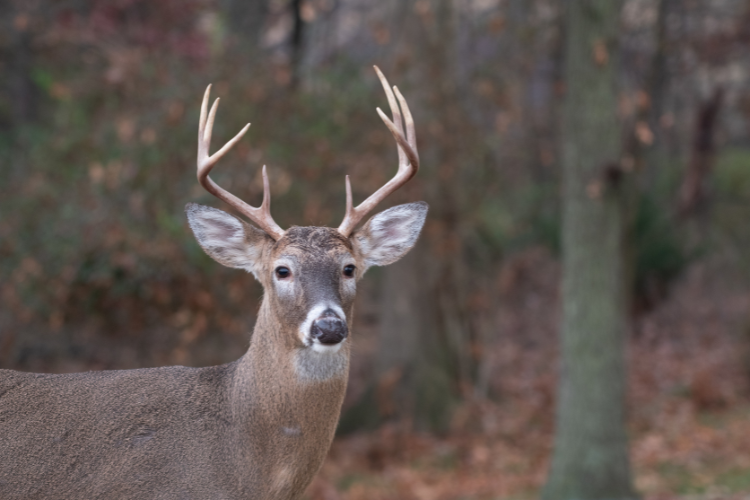Before hitting the woods this fall, make sure you have the correct license and are familiar with the most up-to-date regulations!

Hunting deer in South Carolina requires specific licenses and permits to ensure compliance with state wildlife regulations. Understanding the exact requirements before heading out is essential for a legal and successful hunting experience. This guide will clarify what you need to hunt deer in South Carolina, including licenses, permits, and other important considerations.
To hunt Deer in South Carolina, you’ll need a valid hunting license issued by the South Carolina Department of Natural Resources (SCDNR). Both residents and nonresidents must obtain a hunting license to legally pursue deer within the state.
Residents can purchase a resident hunting license, while nonresidents must buy a nonresident hunting license. These licenses authorize the holder to hunt a variety of game species, including deer.
In addition to a hunting license, deer hunters must have a Big Game Permit and deer tags; if hunting on certain Wildlife Management Areas, a WMA Permit may also be required.
All persons born after June 30, 1979 are required to complete a Hunter Education Course to purchase a South Carolina hunting license. This ensures that hunters understand safety protocols and ethical hunting practices.
Beyond the hunting license, deer hunters need a Big Game Permit and the appropriate deer tags. For residents, the base set of tags issued with a Hunting License + Big Game Permit includes 3 unrestricted antlered buck tags and 2 antlerless deer tags (usable starting date-by-zone).
South Carolina does not require a migratory bird stamp for deer hunting, but hunters should be aware of any special draw or lottery systems for limited permits, especially for certain controlled hunts or special management areas.
The Deer hunting season in South Carolina typically runs from early September through late January, with specific dates varying by method of take and hunting zone. Archery season usually opens first, followed by muzzleloader and general firearm seasons.
South Carolina is divided into several hunting zones, each with its own season dates and regulations. It is crucial to consult the official SCDNR website for the most current and detailed season dates applicable to your hunting area.
For official season dates and updates, visit the South Carolina Department of Natural Resources website to ensure compliance with all timing restrictions.
South Carolina enforces daily and seasonal bag limits for deer to maintain sustainable populations. Deer harvest opportunity is controlled through required deer tags. For residents, the base set issued with a Hunting License + Big Game Permit includes 3 unrestricted antlered buck tags and 2 antlerless deer tags (usable starting date-by-zone), with additional tag purchases available as provided by SCDNR.
Legal hunting methods include the use of archery equipment, muzzleloaders, and firearms, with specific restrictions on calibers and types of methods allowed during certain seasons. Hunters must adhere to these regulations to avoid penalties.
Additional legal considerations include restrictions on baiting, hunting hours, and the use of dogs or other aids. Always verify the latest rules on the SCDNR website before hunting.
Deer hunting in South Carolina is permitted on various public lands, including numerous Wildlife Management Areas (WMAs) managed by the SCDNR. These areas offer diverse habitats and regulated hunting opportunities for deer hunters.
Hunters may also hunt on private lands with explicit permission from the landowner. It is important to secure written consent to avoid trespassing violations.
For detailed maps and tools to locate public hunting lands in South Carolina, visit the SCDNR’s official public land hunting maps portal. This resource helps hunters identify accessible areas and understand specific regulations for each location.
South Carolina requires anyone born after June 30, 1979 to complete hunter education before purchasing a hunting license. This course covers firearm safety, hunting ethics, wildlife conservation, and state-specific regulations.
Hunter education can be completed through in-person classes or online programs approved by the SCDNR. Upon successful completion, hunters receive a certification card necessary for license purchase.
There are exceptions for children under a certain age who are supervised by a licensed adult hunter, but it is recommended to verify these details on the official hunter education page.
For more information and to access hunter education resources, visit https://www.dnr.sc.gov/education/hunted.html or https://recademics.com/hunting/South Carolina.
You can purchase your South Carolina hunting license for Deer through the South Carolina Department of Natural Resources. Licenses are available both online and at authorized license vendors throughout the state.
To buy online, visit the official SCDNR licensing portal where you can select the appropriate resident or nonresident license, add any necessary permits, and complete your purchase securely.
In-person purchases can be made at sporting goods stores, county wildlife offices, and other licensed agents. Be sure to bring any required documentation, such as hunter education certification, if applicable.
For detailed step-by-step instructions and additional guidance, see the comprehensive guide at https://recademics.com/blog/hunting/how-to-get-a-hunting-license-in-South Carolina/.
Yes, in many cases, hunters must obtain an antlerless deer permit in addition to their general hunting license to legally harvest antlerless deer during specific seasons.
Yes, nonresidents can hunt deer but must purchase a nonresident hunting license and comply with all state regulations, including any required permits and hunter education requirements.
Hunter education is required for all first-time hunters purchasing a license. Some exceptions apply for young hunters under supervision, but it is generally recommended for all hunters.
The South Carolina Department of Natural Resources website provides the most up-to-date and official information on season dates, bag limits, and hunting regulations.
Yes, South Carolina regulates the types of weapons allowed during different deer hunting seasons, including restrictions on calibers and archery equipment. Always check the current regulations before hunting.
This is a FREE Boating course.